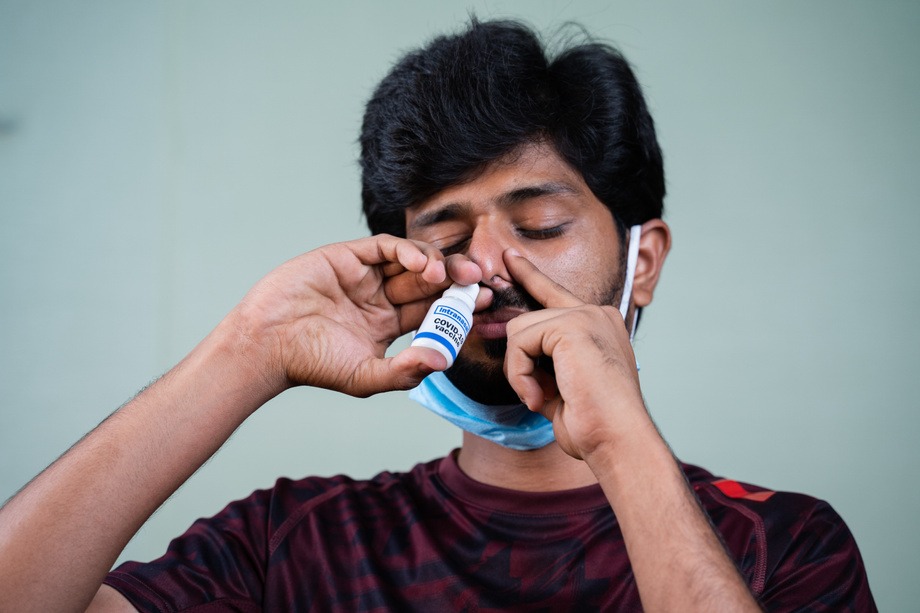Description:
Innovative inhalable vaccine approach that creates a fast-acting immune response in mucosal tissues such as lungs and gut

Background
Current vaccine platforms have mixed success at preventing infection of new emerging infectious diseases and present several limitations. To overcome those limitations researchers at St Georges University of London have developed a protein-only based vaccine that is delivered via a respiratory route and generates robust mucosal immunity.
The development of a vaccine platform that creates an immune response in the lungs and the upper respiratory tract is important for protection against respiratory pathogens like the SARS-CoV2, which is causing the Covid-19 pandemic. And due to the increasing threat of new variants of the virus, not only a refinement of the current approaches is needed, but also entirely new and more effective preventive strategies.
As of today, there is no licensed mucosal (inhaled or oral) vaccine against Covid-19, despite this being predominantly a respiratory disease. Moreover, current vaccines seem to be unable to induce mucosal immunity.
Technology Overview
Researchers at St. Georges, University of London have developed a protein-only based vaccine against SARS-CoV-2 that is delivered via respiratory route and generating robust musical immunity. The vaccine approach was designed to induce a fast-acting robust mucosal immune response in the respiratory and/or gut mucosae, which are key target organs for many types of infection, including the SARS-CoV-2 infection.
This technology is a novel, protein-only based vaccine platform that derives its own adjuvanticity from a unique polypeptide fusion which allows optimal access to the immune system. This invention can be used for pharmaceutical compositions comprising fusion proteins and for the rapid development of protein-based vaccines for the treatment of infectious diseases or cancer.
Being easily adapted against several infectious diseases affecting the respiratory of digestive system (mucosal infections), this aerosolised vaccine can be used alone as an initial immunization, or as a mucosal boost to another systemic vaccine or natural infection and can be instrumental in breaking the transmission chains within the community.
The aerosolised delivery of the polypeptide vaccine by inhalation is particularly amenable for large vaccination campaigns in a relatively short space of time, due to its ease of administration and the reduced need for needle-trained clinical personnel.
Preliminary results show that the developed new l vaccine candidate has a strong potential to be translated into an effective mucosal vaccine against Covid-19, and to be a product that addresses a currently unmet public health need.
With the emergence of new variants, potentially not covered by the existing licensed vaccines, there is a growing market for novel vaccine platforms that enable rapid and easy development, production and regulatory approval to cover such new variants.
Benefits
Simplicity of production: The vaccine candidate was initially produced in plants, which have distinct advantages in terms of simplicity of scaling up and reduced technological requirements, thus making it an affordable production option in resource poor settings.
Produced in plants or mammalian cell line: Although the vaccine candidate was produced in plants, it can also be made in all conventional mammalian cell expression systems.
Optimal for good manufacturing practice (GMP): The protein-only nature of the vaccine is optimal for good manufacturing practice (GMP) production and human application.
Simplicity of formulation: Being based on a single polypeptide, the vaccine production does not require a complex formulation with exogenous adjuvants, simplifying the product consistency and quality assurance during production.
No safety issues: Being protein only vaccine made in plants, there are no significant safety issues with live vectors or attenuated viruses or contaminating pathogens and products from animal culture systems.
Needle-free delivery: with aerosol inhalation, there would be no safety or other issues associated with the use of needles. This type of vaccine eliminates the risk of pathogen cross contamination that may occur and the ‘needle fear factor’, which may improve vaccine uptake and reduce vaccine hesitancy.
Ease of administration: this spray vaccine is extremely simple to administer, not requiring highly trained personnel and even with the potential of being self-administered. The easier administration also represents a clear public health advantage specially to rural communities and low and medium-income countries.
Applications
The vaccine delivery platform is being developed and tested in the context of SARS-Cov2 infection, but it can be easily adapted against several other mucosal infectious diseases.
The technology can be used in plant expression systems and conventional mammalian expression system.
Opportunity
St Georges is looking for an industrial partner interested in vaccine development to demonstrate feasibility of the scale up of production and bring the technology to the market.
The mucosal boost vaccine can be of interest to pharmaceutical/vaccine companies that specialize in rapid vaccine response development, and, in an ever-changing pathogen landscape, this is a very commercially viable technology.
Patents
Patent Application in progress